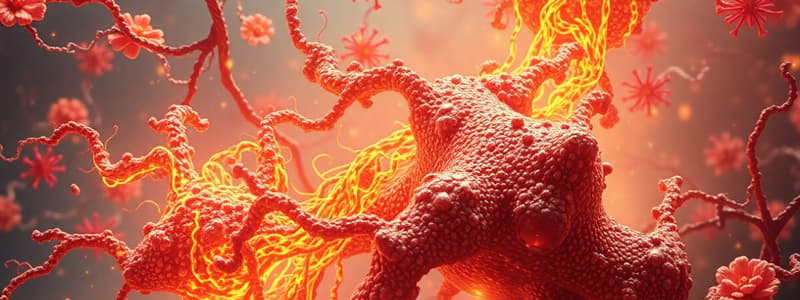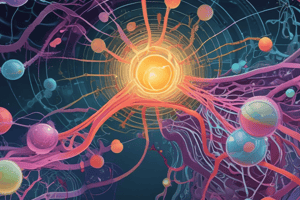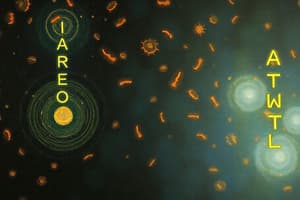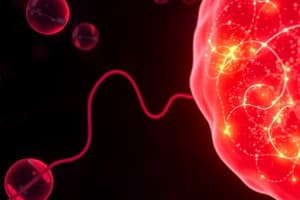Podcast
Questions and Answers
Which hormone primarily acts to increase the expression of anorexigenic peptides in POMC neurons?
Which hormone primarily acts to increase the expression of anorexigenic peptides in POMC neurons?
- Insulin (correct)
- Adiponectin
- Leptin
- Ghrelin
What condition is almost always caused by obesity according to the content?
What condition is almost always caused by obesity according to the content?
- Insulin resistance (correct)
- Excessive weight gain
- Hyperactivity of the immune system
- Increased appetite
What is the effect of TNFα on insulin receptors in the context of obesity?
What is the effect of TNFα on insulin receptors in the context of obesity?
- It has no impact on insulin receptors.
- It inhibits insulin receptors and IRS. (correct)
- It decreases insulin sensitivity without affecting receptor numbers.
- It enhances insulin receptor expression.
As obesity progresses, what happens to the number of insulin receptors according to the content?
As obesity progresses, what happens to the number of insulin receptors according to the content?
What consequence can result from insulin resistance in obese individuals?
What consequence can result from insulin resistance in obese individuals?
What happens to LDL circulation in plasma as a result of saturated fatty acids in the diet?
What happens to LDL circulation in plasma as a result of saturated fatty acids in the diet?
What is one of the striking clinical features of overweight individuals related to serum lipids?
What is one of the striking clinical features of overweight individuals related to serum lipids?
How do trans-fatty acids behave in relation to LDL receptors?
How do trans-fatty acids behave in relation to LDL receptors?
What is the effect of saturated fatty acids on VLDL formation?
What is the effect of saturated fatty acids on VLDL formation?
What metabolic alteration is associated with a diet high in saturated fatty acids?
What metabolic alteration is associated with a diet high in saturated fatty acids?
What role does tumor necrosis factor alpha (TNF-α) play in insulin resistance?
What role does tumor necrosis factor alpha (TNF-α) play in insulin resistance?
Which of the following is NOT associated with obesity according to the content?
Which of the following is NOT associated with obesity according to the content?
How does obesity affect insulin receptor characteristics?
How does obesity affect insulin receptor characteristics?
Which factor predominantly contributes to insulin resistance in obese individuals?
Which factor predominantly contributes to insulin resistance in obese individuals?
What effect does a high level of free fatty acids have in the context of obesity?
What effect does a high level of free fatty acids have in the context of obesity?
What is one consequence of decreased insulin receptor signaling in obesity?
What is one consequence of decreased insulin receptor signaling in obesity?
Which of the following processes is directly inhibited by TNF-α in the context of insulin action?
Which of the following processes is directly inhibited by TNF-α in the context of insulin action?
What is a common result of the increased production of inflammatory chemicals in obesity?
What is a common result of the increased production of inflammatory chemicals in obesity?
Which of the following statements best describes the effect of insulin in lean individuals?
Which of the following statements best describes the effect of insulin in lean individuals?
What impact does obesity have on insulin receptor substrate 1 (IRS-1)?
What impact does obesity have on insulin receptor substrate 1 (IRS-1)?
Flashcards are hidden until you start studying
Study Notes
Fuel Input and Metabolic Demand
- Oxygen (O2) storage is critical for energy production through ATP (adenosine triphosphate) synthesis.
- Metabolic demand leads to energy expenditure, influenced by food intake.
Obesity and Dietary Factors
- Overweight individuals exhibit elevated serum free fatty acids, cholesterol, and triacylglycerols regardless of dietary fat intake.
- Saturated fatty acids reduce LDL receptor expression, increasing LDL circulation time in plasma.
- Increased VLDL (very low-density lipoprotein) formation is linked to saturated fatty acid and trans-fatty acid consumption.
Neural Regulation of Food Intake
- Insulin binding to insulin receptors (IR) on POMC neurons promotes anorexigenic peptides (e.g., POMC, CaRT), reducing food intake.
- AgRP neurons, when influenced by insulin, decrease orexigenic peptides (AgRP, NPY), thereby controlling hunger signals.
Insulin Resistance and Obesity
- Obesity typically results in insulin resistance due to a decreased number or malfunction of insulin receptors.
- High body fat correlates with increased insulin resistance, leading to elevated plasma insulin levels and potential type 2 diabetes development.
Mechanisms of Insulin Resistance
- TNF-alpha production by enlarged adipose cells inhibits insulin receptor activity and insulin receptor substrate (IRS) functionality.
- Increased HSL (hormone-sensitive lipase) activity contributes to higher fatty acid release, compounding insulin resistance effects.
Obesity Treatment: Combination Therapy
- Topiramate enhances GABA release, suppressing NPY and reducing hunger feelings.
- Phentermine prompts noradrenaline release, stimulating POMC neurons to promote satiety, while reducing hunger signals.
Obesity Treatment: Lipase Inhibitors
- Orlistat inhibits pancreatic lipase, preventing absorption of about 30% of dietary fat, contributing to weight loss through reduced calorie intake.
- Common side effects of lipase inhibitors include abdominal pain, bloating, and risk of cholestatic hepatitis due to altered fat digestion.
Studying That Suits You
Use AI to generate personalized quizzes and flashcards to suit your learning preferences.




